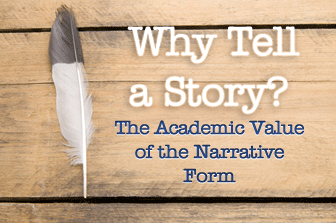Teaching the Art of Outlining in Composition


However, there is a lot of value in the narrative form, and it can serve as a springboard to the academic essay. I am not advocating that all or even most of a class on academic writing should focus on a narrative essay. However, the narrative form can serve as a starting-off point for academic writing.

Why do we read stories? Their power to transport us. They develop in the writer audience awareness. If in proving the dangers of cigarette smoking, I tell you about my father’s struggle to beat the nicotine habit, I’m likely to hold your interest much more powerfully than I would in an essay about the case against tobacco that uses statistics and dry facts. Also in telling the story of my father’s battle, I as the writer begin weighing different elements and the impact on the reader: How much detail should I include? Should I go on at length about the different programs he was involved in, or just summarize? Which is more effective? When writing an academic essay, I’m likely to eyeball the page and think, “Okay, I’ve got three facts for support; I’m done,” without going through the critical evaluation I would with a story.
Along with audience awareness, the writer has to develop a sense of structure, of how to open, to build momentum, and to wrap up. Often teachers struggle over these issues laboriously for weeks in a composition class because essays are largely an inauthentic, unfamiliar forms, existing in few places outside the writing classroom. However, in writing a story, students often know almost intuitively how to open the story and get their audience’s attention---it’s what they’ve been doing most of their lives, after all. Storytelling exists in all cultures, and all parents and children tell each other stories, and therefore children develop the skill in doing it. These skills can then transfer to the academic essay.
When writing essays, students, native and nonnative speakers alike, struggle over which verb tense to use in the unfamiliar essay genre, often switching back and forth haphazardly. However, it’s much plainer why a story usually needs to be in the past time frame, for the majority of it, at any rate, perhaps opening in the present to introduce the story and switching back at the end, to reflect on the experience. Discussing why these tenses are used then serves as a foundation for later further verb tense practice.
Again, the academic essay is an unfamiliar genre, and students sometimes have to be drilled repeatedly in how to set up the introduction, the body, and the conclusion. However, a storyteller knows he has messed up when he has to say, “Oh, sorry, forgot to tell you, before this happened, I had been at the party where I…” because his listeners immediately begin to drift and check their watches and phones. Stories have to be told in chronological order or you lose your audience, so you have to organize and structure your material.
Again, a speaker when telling a story almost intuitively knows she has to make connections for the listener with such terms as “last night” and “Then later that same evening…” Understanding this skill can transfer to the more varied academic transitions, such as “in the case of—“ and “other the other hand.”
Anyone who has ever captivated an audience with just the right words, or driven it to laughter or tears, knows how important the right set of words is. People don’t usually have the same kind of response to an essay.
Students seem to care more about their stories, the characters and what happens to them, and how their stories are told, than they do their essays; there is more of a personal connection. This connection and sense of ownership is powerful. Students are more likely to pay attention to details, to labor over correct grammar and punctuation and general presentation, with something they feel attached to.
A storyteller knows the part of a story the audience is most likely to remember is the ending and will therefore put effort into the conclusion: to know where to end it, for example, and to end with some kind of message, image, or idea for the reader to take from the story.
Why did I tell you this story? Listeners are likely to be angered if they’ve sat through a story with no point. Similarly, all essays should have some point to it. While the main point, or thesis, does not have to be stated directly at the beginning, as is traditionally the case in the academic essay, and probably should not be, in a story, there should be some point to the story whether or not it’s directly stated.
It also has many of the same features, such as introductions, conclusions, and a specific organization, that teachers struggle, often unsuccessfully, to teach in academic essays. Stories and the narrative form, while in no way replacing the academic essay, can serve as a scaffolding device for more difficult, academic genres because of their shared features and learner familiarity with stories...